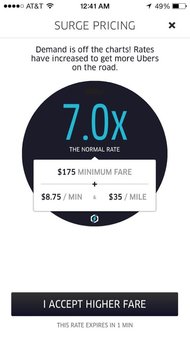Uber’s “surge pricing” again angers people who don’t understand economics
BusinessUber, the car-service startup striking fear into city bureaucrats and taxi cartels everywhere, is catching flack from some New Year’s Eve revelers who discovered they were charged hundreds of dollars for a ride home:
…there were a ton of complaints on New Year’s Eve from customers caught by surprise by some hefty fares. In fact, if you look at Uber’s Twitter feed right now, it’s dominated by a series of apologies for the “sticker shock” it caused last night.
Meanwhile, several angry customers have been tweeting screenshots of their sky-high Uber fares. Some are as much as $350 for just a few miles, which was almost enough to get you a booze-filled evening at the Applebee’s in Times Square.
 “Caught by surprise” is rather subjective, as Uber took great pains to warn users that surge pricing, its policy of multiplying fares during periods of high demand, would be in effect on New Year’s Eve. Furthermore, the Uber app requires users to acknowledge when surge pricing is in effect, even going so far as requiring manual input of the fare multiplier before hailing a car.
“Caught by surprise” is rather subjective, as Uber took great pains to warn users that surge pricing, its policy of multiplying fares during periods of high demand, would be in effect on New Year’s Eve. Furthermore, the Uber app requires users to acknowledge when surge pricing is in effect, even going so far as requiring manual input of the fare multiplier before hailing a car.
So whose fault is it that users were rung up for $350 car rides? Nobody’s, of course. Uber’s surge pricing policy is not only legal, but entirely fair and rational. Rapidly adjusting pricing to meet short periods of high demand helped ensure that cars were available to people who really wanted them. Anybody wishing to avoid high fares could find an all-night diner or someplace safe to relax until demand dropped and surge pricing was no longer in effect.
There’s another name for this practice, used by people who don’t like free markets: “price gouging”. Most commonly, this pejorative refers to rapidly increasing prices of essential supplies in the aftermath of a natural disaster. This is illegal in many states, and it’s easy for the media to demonize “gouging” when people have lost their homes and are looking for food, water, fuel, and shelter. Yet the principles which make it okay for Uber to raise fares so drunks can get home should apply to states of emergency as well. Price gouging, or surge pricing, helps ensure that resources are allocated as efficiently as possible. Preventing businesses from setting their own prices via threat of prosecution invariably leads to the kind of shortages that hamper relief efforts.
This also helps explain why taxicabs are virtually impossible to find on any big party night: their fares are regulated, set by the local taxi or public utilities commission, and neither companies nor drivers are free to raise prices when there’s high demand. Private car services like Uber, meanwhile, are unregulated, which is why you can always find someone to drive you home after the ball has dropped and the last bottle of champagne is drunk — if you’re willing to pay for it.
Uber’s “surge pricing” again angers people who don’t understand economics Read Post »

 The morning after I saw “Catching Fire,” part two of the film series based on the Hunger Games novels, I was scheduled to give a lecture on the nature and functioning of the state. I had vast notes I had prepared over the previous six months for it.
The morning after I saw “Catching Fire,” part two of the film series based on the Hunger Games novels, I was scheduled to give a lecture on the nature and functioning of the state. I had vast notes I had prepared over the previous six months for it.